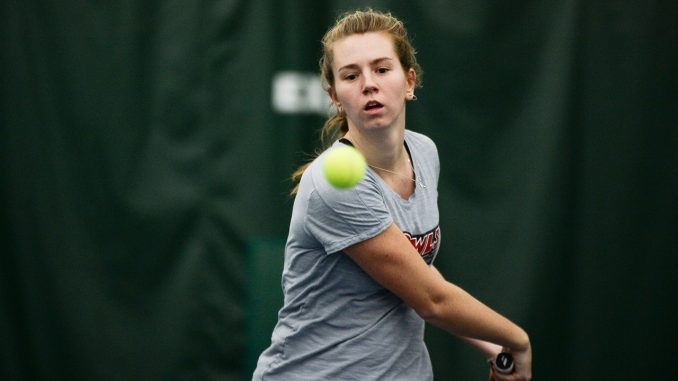
Most collegiate sports require an officiating crew, but tennis allows players to make their own calls.
Coach Steve Mauro believes players should be allowed to make their own calls, but they have to be honest.
“We’re on the honor system in tennis,” Mauro said. “People are supposed to be fair. If for some reason they aren’t fair, that’s why the official steps in.”
Division I players can make their own judgments on whether the ball is inside the lines on the court. Senior Thomas Sevel said players have to make their own calls because there are only two officials going around during each competition, which has several matches happening at once.
Mauro said the only exception to players self-officiating matches is if there is a call in question or disagreement between the players. In that case, the official has the ability to overrule the call.
“We’re never going to be able to always have a referee,” Sevel said. “When there’s competition or something in play, they’re going to find people who are doing so badly that they’re going to cheat. [Referees] have to know how to handle it.”
Sevel is used to making his own calls. He said tournaments in his native France had five or six matches happening simultaneously, but there was only one official at the tournament. When Sevel came to the United States to play at Augusta University, a Division II school in Georgia, the officiating situation was the same.
Now at Temple, sometimes there is an official present at each court, especially when the Owls travel to play against bigger schools. For example, when Temple (8-4, 0-1 American Athletic Conference) lost to Penn State, 7-0, on Feb. 3, there was an official at each court, Sevel said.
Junior Alberto Caceres Casas believes officials should be observing each match in order to make a decision on calls in question.
Like Sevel, Caceres Casas made his own calls in his native Spain and at his previous school, Armstrong State University, a Division II school in Savannah, Georgia.
According to the Intercollegiate Tennis Association’s rulebook, when an official has only one match under his or her jurisdiction, the official must sit in a chair near the court in order to get a better view of the match.
“If the umpire makes [the call], he has to be near the court,” Caceres Casas said. “He cannot be walking around the courts. He should sit down on a chair, or we make our own calls.”
Though she has had to call her own lines for her entire tennis career, junior Alice Patch believes officials should make the calls as long as they are observing the match.
“Some people are not overly fair,” Patch said. “If there was a referee, it would make the game more fair. You have to be mature about it and sportsmanlike.”
Sevel said Division I officials have made better calls than Division II officials in his experience.
“I’ve never had big issues here,” Sevel said. “Sometimes when I played in Division II, I had some tough matches where the referee wasn’t very precise on the rules.”
Because his players have been calling their own lines for their whole careers, Mauro trusts his players to be fair.
“We really haven’t had too many problems with our players or opposing players calling lines,” Mauro said. “It’s just a part of tennis. It’s something they’ve done since they were 10 years old.”



Be the first to comment